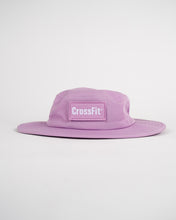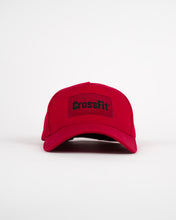Northern Spirit: 15 years ago, athletes practiced CrossFit® in a confidential way, on simple fields or in garages. Today, we have the impression that something is happening and that the discipline is passing a turning point. How do you feel about the evolution of CrossFit® in France in the recent years?
Daniel Chaffey: 15 years ago, people who practiced CrossFit® were just crazy, and I was one of them. They were the forerunners. Then, came the people who were looking for an underground discipline, a kind of Fight Club. They wanted to swim against the tide.
Today, people who walk through the doors of a box have never heard of the Games. They've heard people who practice CrossFit® say to them: "Do you want to get back into shape? Do you want to age well? Do you want to be able to ski without feeling sore after three days? Come with me, the best thing for you is CrossFit®". Today we talk to these people. We even have people coming to a CrossFit® box because they want to be part of this growing movement, and that's great.
But if we're where we are today, it's because there are 800 box managers in France who have sacrificed a lot over the last 10-12 years so that CrossFit® could develop. They've put everything they've got to open their gym. They're passionate people who want to share CrossFit® with the world.
French sports are focused on a single sport, whereas CrossFit® is multidisciplinary. Hasn't this hindered its development in France ?
CrossFit® is a general physical preparation program. A lot of people come to do CrossFit® to improve their level in their sport. French people are footballers, judokas, or rugby players, but they can be better at their sport by coming to CrossFit®.
A lot of people think that CrossFit® is an ego-driven discipline, a body cult. Do you think these prejudices are being shattered ?
The prejudices are still there, but it's important to understand that ego is a drag for the CrossFitter. At every training session there's a fixed goal, which you try to achieve with other CrossFitters. If you have too big of an ego, CrossFit® will throw it back to your face.
I've got a big ego, I like to win, but when I'm training, I'm humble, because I'm training with other people. There is a collective dimension. CrossFit® is a good way of getting your ego under control.
I'm asking you this question because I stumbled across a blog article which said that CrossFit® was becoming an ego sport, with practitioners putting themselves on display on Instagram...
CrossFit® isn't a program that you follow individually by setting up a camera. Practicing CrossFit® isn't about looking good, it's not about aesthetics. I think people who think like that haven't yet understood all the benefits of CrossFit®, such as socialization, mental health and performance enhancement.
Many practitioners love the community dimension of CrossFit®. They have the impression of having found a family, and sometimes even practicing a collective sport. This collective dimension is sometimes difficult to grasp as the CrossFitter is alone with his WOD.
It's like a good meal. At home I can cook with good ingredients, make myself a nice plate and eat a delicious dish. But I can prepare the same meal and invite friends at my table. Those same ingredients then take on another dimension, other flavors, because I'm sharing them with others. It's the same with a WOD: I can do a WOD on my own, but the feeling is different if I share it.
According to you, was it the collective dimension that appealed to you, over and above the sporting aspect ?
I used to play team sports and I like the collective dimension, and it's difficult to find it again when you leave your club. With age, work, and family, we have less and less time to get together with friends. CrossFit® allows you to kill two birds with one stone: train and share a moment with other people at the same time.
How can CrossFit® become a mass sport in France ?
Schools, emergency services and the Ministry of Health are all action levers that could enable CrossFit® to become a mass sport, with one credo: an ounce of prevention is worth a pound of cure. A doctor is like a lifeguard at sea and a CrossFit® coach is like a swimming coach: it's better to know how to swim than to need to be rescued at sea because you can't swim.
I do a parallel between CrossFit® and MMA, which is also a growing discipline that has come up against the intransigence of certain French sporting institutions that have put the brakes on its development.
CrossFit® isn't just a sport, it's a methodology. I'm glad I'm not part of a federation because it's too politicized. Some federations may have had a negative view of CrossFit® because they were afraid. They saw CrossFit® as a competitor, but that's not the case. CrossFit® is multidisciplinary and its aim is not to prevent people from practicing a sport, but to help them practice it better. We're here to get people moving, and to prepare them to train better.
As one of the pioneers of CrossFit® in France, how do you see the discipline’s future ?
We've just passed the 800 boxes of CrossFit® in France, making it the biggest country after the United States. This growth shows no signs of slowing down, because the methodology is real, and it works. As soon as people are touched by CrossFit®, they want to share it and that helps developing it. I think it will reach its limit at some point: the number of new boxes will slow down, but the number of participants per box will increase.
Box owners are maturing, they're talking to more people and not just people like them. Boxes are evolving too. At first, they only offered training for adults, but now there are sessions for over 55 years old people, teenagers, and children. We're learning to speak to a wider section of the population.
You've worked a lot with box owners, helping them organizing themselves, become more professional and manage their boxes. Has this work come to fruition?
The success rate for a CrossFit®-affiliated box is 95% over 3 years. To succeed, a box owner must fulfil three objectives: enjoying practicing CrossFit®, enjoying to coach, and manage his or her structure well. And many of them are aware that they need to learn how to manage their box well. You need to know how to attract potential trainees, convert them into new members and integrate them into your existing community. The best marketing for a box is a member that approves himself, because that will generate word of mouth. It is our greatest strength because the methodology works.












